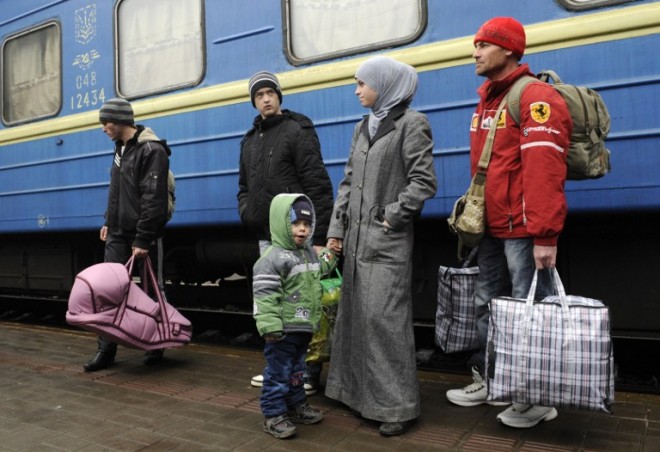Crimea’s ethnic Tatars flee for fear of Moscow backlash

A family of Crimean Tartars disembarks from a train as they arrive from Simferopol to the western Ukrainian city of Lviv on March 7, 2014. Russia’s annexation of Crimea has sent hundreds of the region’s ethnic Tatars fleeing the peninsula for western Ukraine out of fear of a backlash from Moscow. AFP PHOTO/YURIY DYACHYSHYN
LVIV, Ukraine—Russia’s annexation of Crimea has sent hundreds of the region’s ethnic Tatars fleeing the peninsula for western Ukraine out of fear of a backlash from Moscow.
The Tatars, a native Muslim community of about 300,000, largely boycotted a March 16 referendum on whether their historic homeland should come under Kremlin control.
Memories of the mass deportations organized under Moscow’s Soviet rule in the 1940s are still fresh in the Turkic-speaking minority.
And after Russia’s seizure of Ukraine’s last airbase in Crimea on Saturday—which Kiev fears could herald an imminent Russian invasion—many fear Tatars could be targeted again.
“This journey is like leaving the Soviet Union for a different country,” said Adele, a Tatar arriving for the first time in Ukraine’s westernmost city.
Article continues after this advertisementAlong with hundreds of other Tatars, most of them women and children, she made the 30-hour, 1,200-kilometer (745-mile) train trip across Ukraine to Lviv.
Article continues after this advertisementOpen doors
Known as “the little Paris of Ukraine,” the western city’s government and residents have opened their doors to the new arrivals.
Local authorities say nearly 2,000 people from Crimea and neighboring areas have temporarily settled in the region, more than half of them children.
Registration is easy, and 375 families in Lviv and the surrounding area have said they are ready to host them.
Adele, a mother of three who worked as a bank accountant, has been luckier than most. She and her family are guests at the home of Mariana and Taras, and have an apartment of 90 square meters (970 square feet) all to themselves.
There they have won hearts with their Tatar cooking, including sherpa soup that features generous portions of meat, onion, carrots and other vegetables.
Mariana in turn has shared her own secret dishes such as varenyky, a type of Ukrainian ravioli.
“We got scared when the Russian troops were shooting,” said Adele.
“The soldiers didn’t explain anything; they only said they were following orders.”
The 29-year-old was unable to say how long she would stay in Lviv, but stressed she was determined to go back to Crimea as soon as possible.
“I want peace in Crimea,” she said. “I love our country and want to return home.”
In the meantime, she has enrolled her children in a Lviv kindergarten.
Fears of ‘ethnic cleansing’
Alim Aliev, a community leader who helps the new arrivals to settle in Lviv, explained that most Tatar men chose to stay in Crimea “to defend their land.”
“As long as there are Tatars in Crimea, Crimea will remain in Ukraine,” he said.
Most of Crimea’s Tatars—who make up some 12 percent of the population—are from impoverished families, and some of them do not speak Ukrainian or Russian.
Linara, a young Tatar woman who just got off the train from Simferopol, said she feared her community would be ethnically cleansed from the strategic peninsula.
“We’re afraid of being physically removed. We’re afraid of the Russian military,” she said.
“I don’t want such a future for my children.”
Many Tatars don’t want to reveal their names or have their photos taken out of fear they could be identified by Moscow.
Russian President Vladimir “Putin is (like) Stalin, but even worse. This one is a fascist,” said one Tatar who had just disembarked from a train in Lviv.
“My father told me what (Soviet ruler Joseph) Stalin did to us,” he said, referring to the mass deportations of Tatars to Central Asia in 1944.
“We’re afraid of the Russians. If someone learns that we have left, they might take our land or our home.
“I don’t want the Russians to know that I’m here, or where I come from.”—Vassyl Trukhan